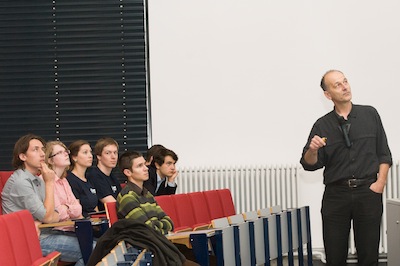Team:KU Leuven/Human Outreach/Seminars
From 2013.igem.org
| Line 122: | Line 122: | ||
</div> | </div> | ||
<div class="span8"> | <div class="span8"> | ||
| - | <p align = "justify"> | + | <p align = "justify">We organized a symposium on synthetic biology with two scientific seminars at our symposium, one given by <a href="http://www.kuleuven.be/wieiswie/en/person/u0005880">prof. dr. Johan Robben</a> and <a href="http://www.kuleuven.be/verstrepen/en">prof. dr. ir. Kevin Verstrepen</a>. Next to that, two iGEM-teams presented their projects. This symposium also offered a great opportunity for reaching out to the public. 150 people, students, academics, but also non-scientists, attended the symposium!<br/><br/> |
| - | <br/><br/> | + | The first lecture was given by professor Johan Robben, who is one of our instructors this year and has been for every participation of the KU Leuven in the competition. He currently supervises the new lab for molecular and synthetic biology. His lecture revolved around the <b>basic understanding of living nature and how this eventually evolves into changing nature.</b> This was followed by a lecture of professor Kevin Verstrepen. After a period of scientific research and teaching at the MIT and Harvard professor Verstrepen returned to the KU Leuven where he continues his research about fundamental genetics. <b>The subject of the lecture is related to that: how does DNA coding for new functions come into existence?</b><br/><br/> |
| - | The first lecture was given by professor Johan Robben, who is one of our instructors this year and has been for every participation of the KU Leuven in the competition. He currently supervises the new lab for molecular and synthetic biology. His lecture revolved around the <b>basic understanding of living nature and how this eventually evolves into changing nature.</b> This was followed by a lecture of professor Kevin Verstrepen. After a period of scientific research and teaching at the MIT and Harvard professor Verstrepen returned to the KU Leuven where he continues his research about fundamental genetics. <b>The subject of the lecture is related to that: how does DNA coding for new functions come into existence?</b> | + | After the lectures, the public had gotten a taste for synthetic biology and it was time for <b>us and the delegation of the Groningen iGEM team to present our projects.</b> We invited all the Benelux (Belgium, The Netherlands and Luxembourg) iGEM-teams, but that close to the deadline of the European Jamboree, only the team from Groningen could make it for the presentation. In short presentations of twenty minutes we explained the content of our project and its uses to the public. We received useful information to improve our presentation for the European Jamboree! |
| - | <br/><br/> | + | |
| - | After the lectures, the public had gotten a taste for synthetic biology and it was time for <b>us and the delegation of the Groningen iGEM team to present our projects.</b> In short presentations of twenty minutes we explained the content of our project and its uses to the public. | + | |
</p> | </p> | ||
</div> | </div> | ||
Revision as of 23:19, 28 October 2013
Secret garden
Congratulations! You've found our secret garden! Follow the instructions below and win a great prize at the World jamboree!
- A video shows that two of our team members are having great fun at our favourite company. Do you know the name of the second member that appears in the video?
- For one of our models we had to do very extensive computations. To prevent our own computers from overheating and to keep the temperature in our iGEM room at a normal level, we used a supercomputer. Which centre maintains this supercomputer? (Dutch abbreviation)
- We organised a symposium with a debate, some seminars and 2 iGEM project presentations. An iGEM team came all the way from the Netherlands to present their project. What is the name of their city?
Now put all of these in this URL:https://2013.igem.org/Team:KU_Leuven/(firstname)(abbreviation)(city), (loose the brackets and put everything in lowercase) and follow the very last instruction to get your special jamboree prize!


Symposium

Prof. Johan Robben talking at our seminar.

The iGEM 2013 Team of Groningen presenting at our seminar.
We organized a symposium on synthetic biology with two scientific seminars at our symposium, one given by prof. dr. Johan Robben and prof. dr. ir. Kevin Verstrepen. Next to that, two iGEM-teams presented their projects. This symposium also offered a great opportunity for reaching out to the public. 150 people, students, academics, but also non-scientists, attended the symposium!
The first lecture was given by professor Johan Robben, who is one of our instructors this year and has been for every participation of the KU Leuven in the competition. He currently supervises the new lab for molecular and synthetic biology. His lecture revolved around the basic understanding of living nature and how this eventually evolves into changing nature. This was followed by a lecture of professor Kevin Verstrepen. After a period of scientific research and teaching at the MIT and Harvard professor Verstrepen returned to the KU Leuven where he continues his research about fundamental genetics. The subject of the lecture is related to that: how does DNA coding for new functions come into existence?
After the lectures, the public had gotten a taste for synthetic biology and it was time for us and the delegation of the Groningen iGEM team to present our projects. We invited all the Benelux (Belgium, The Netherlands and Luxembourg) iGEM-teams, but that close to the deadline of the European Jamboree, only the team from Groningen could make it for the presentation. In short presentations of twenty minutes we explained the content of our project and its uses to the public. We received useful information to improve our presentation for the European Jamboree!
 "
"



